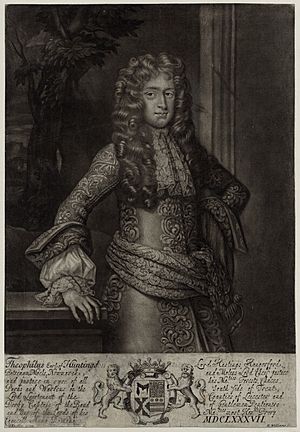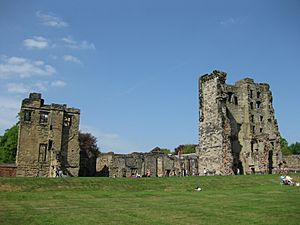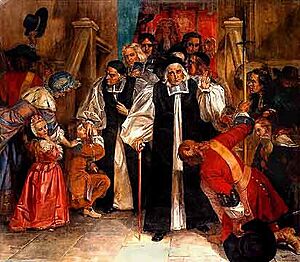Theophilus Hastings, 7th Earl of Huntingdon facts for kids
Quick facts for kids
The Earl of Huntingdon
|
|
|---|---|

Theophilus Hastings, 7th Earl of Huntingdon
|
|
| Lord Lieutenant of Leicestershire | |
| In office 11 August 1687 – 6 April 1689 |
|
| Preceded by | Earl of Rutland |
| Succeeded by | Earl of Rutland |
| Lord Lieutenant of Derbyshire | |
| In office 23 December 1687 – 16 May 1689 |
|
| Preceded by | Earl of Scarsdale |
| Succeeded by | Duke of Devonshire |
| Privy Councillor | |
| In office 1683–1690 |
|
| Personal details | |
| Born | 10 December 1650 |
| Died | 30 May 1701 (aged 50) |
| Spouses | Elizabeth Lewis (1654–1688, her death) Mary Fowler (1664–1701, his death) |
| Children | 15 |
| Parents | Ferdinando Hastings, 6th Earl of Huntingdon Lucy Davies |
Theophilus Hastings, 7th Earl of Huntingdon (born December 10, 1650 – died May 30, 1701) was an important English politician in the 1600s. He supported King James II of England, even when many others did not. Some historians have described him as someone who changed sides easily or was very loyal to the Stuart kings.
His family, the Hastings, used to be very powerful in Leicestershire. But their influence had lessened over time. Theophilus wanted to bring his family back to their former glory. This goal guided many of his political decisions.
During a time called the Exclusion Crisis (1679-1681), he first supported stopping the Catholic heir, James, Duke of York, from becoming king. But then he changed his mind in 1681. When James became king in 1685, he had a lot of support. However, this support faded when King James's religious policies seemed to go against the legal system and the Church of England. By late 1687, Theophilus Hastings was one of the few non-Catholic leaders who still actively helped the king.
Even people who believed James was the rightful king after 1688 thought the Church of England was very important. Hastings was seen by some as actively working against his own church. This hurt his reputation among people at the time. He lost his official jobs in 1690 but kept attending the House of Lords. He remained a strong supporter of the Jacobite cause, which wanted to bring James II back to the throne. His daughter, Lady Elizabeth Hastings (1682-1739), became known for helping others and supporting education for girls.
Early Life and Family
Theophilus Hastings was born on December 10, 1650. He was the fourth son of Ferdinando Hastings, 6th Earl of Huntingdon, and his wife, Lucy. Theophilus had ten siblings. His three older brothers passed away before he was born. This meant he became the Earl of Huntingdon in 1656 when he was just five years old.
The Hastings family was once the most important family in Leicestershire. But they lost much of their wealth and power. This happened because they spent too much money and suffered losses during the Wars of the Three Kingdoms (1642-1651). Theophilus's father stayed neutral in the wars. However, his uncle, Henry, led the king's forces at the family home, Ashby de la Zouch Castle. This castle was partly destroyed in 1648 by the Parliamentarian forces.
After the castle was damaged, the family moved to their estate at Donington Hall. Theophilus was taught there by his mother and his uncle Henry. His uncle Henry returned from exile after the king was restored to power in 1660. Henry was also given the title Henry Hastings, 1st Baron Loughborough and became Lord Lieutenant of Leicestershire. This was a position the Hastings family had held for a long time. When Henry died in 1667, John Manners, 8th Earl of Rutland, took over the role. Theophilus really wanted to get this important position back for his family.
In 1672, Theophilus married Elizabeth Lewis. She passed away in 1688. Elizabeth's sister, Mary, was married to the Earl of Scarsdale. Both sisters inherited a lot of money from their wealthy merchant father, Sir John Lewis. Theophilus and Elizabeth had nine children, but only two lived to be adults. These were George, 8th Earl of Huntingdon (1677-1704) and Lady Elizabeth Hastings (1682-1739). Lady Elizabeth became famous for supporting education for women.
After Elizabeth died, Theophilus married Mary Fowler in 1690. She was a rich widow. They had two sons and four daughters who survived.
Political Career
Theophilus Hastings took his place in the House of Lords. He usually supported the king until 1677. At that time, the 9th Earl of Rutland became Lord Lieutenant. The Manners family had supported Parliament in the Civil Wars. Hastings felt his family's loyalty to the king was not being rewarded. He joined a group led by Shaftesbury. This group was against King Charles II trying to rule without Parliament. They also spoke out against "Popery" (Catholic influence) and "arbitrary government" (rule without laws).
The idea of the Catholic Duke of York becoming king was seen as a step towards a king having absolute power. This led to the Exclusion Crisis from 1679 to 1681. Hastings strongly supported preventing James from becoming king. At one dinner in 1679, he even toasted to the Protestant Duke of Monmouth, who was seen as an alternative to James. He also wished "confusion to Popery," which caused arguments with other guests.
During the anti-Catholic movement known as the Popish Plot in 1680, Hastings voted to execute Viscount Stafford. This led to the execution of 22 people accused of plotting against the king and caused a lot of unrest. In August 1681, Titus Oates, who made the accusations, even accused the Queen of trying to poison King Charles.
This accusation was seen as going too far, and many people, including Hastings, stopped supporting Oates. Hastings had been banned from the King's Court in 1680, but he was welcomed back in October 1681. In February 1682, he bought the position of Captain of the Honourable Band of Gentlemen Pensioners for £4,500. This was a ceremonial bodyguard role that gave him close access to the king. He joined the Privy Council in 1683. When James became king in February 1685, Hastings was made a judge and a colonel in an infantry regiment.
When James became king, he had a lot of support. People remembered the Wars of the Three Kingdoms and feared what would happen if the rightful heir was removed. This is why the Monmouth Rebellion and Argyll's Rising quickly failed in June 1685. However, the Church of England and the legal system were very important for a stable society. King James's religious policies seemed to weaken the Church, and his attempts to enforce them attacked the legal system. When Parliament refused to pass his new laws, he suspended it in November 1685. After that, he ruled by royal orders. While the idea of royal orders was accepted, the way he used them was not. Judges who disagreed with him were removed from their positions.
This meant King James had to rely on a few loyal supporters, and Hastings was one of them. In July 1686, Hastings became a member of the Commission for Ecclesiastical Causes. This group was set up to make sure the Church of England followed the king's rules. Some people, including his first wife, thought he might be secretly Catholic. This was a big deal because the Commission was supposed to enforce rules on the Church of England. Suspicions grew when he was excused from the Test Act of 1678. This law required officials to swear they would uphold the Protestant religion.
In late 1687, King James tried to make sure the next Parliament would support his Declaration of Indulgence. This meant only people who agreed to repeal the Test Act could run for election as Member of Parliament. Lord-Lieutenants were asked to administer the "Three Questions" to potential candidates. Many resigned rather than do this, including Scarsdale. Hastings then replaced Scarsdale as Lord Lieutenant of Derbyshire.
King James's policies, along with the trial of the Seven Anglican bishops in June 1688, seemed to go beyond just allowing Catholics and Nonconformists to practice their faith. It looked like an attack on the Church of England itself. Most of King James's supporters, including Lord Chancellor Jeffreys, now abandoned him. When Jeffreys refused to sign the order to send the bishops to the Tower of London, Hastings signed it instead. This action was later held against him.
When the bishops were found not guilty, there were huge celebrations. It seemed that only removing James from the throne could prevent widespread unrest. Most of his Tory supporters left him. Seven important people, including representatives from different political groups and the Church, invited William of Orange to take the English throne. During the Glorious Revolution in November 1688, Hastings and his regiment were sent to secure Plymouth. When they arrived, the governor, the Earl of Bath, arrested Hastings because he supported William.
Hastings was released on December 26, two days after his wife passed away during childbirth. He was one of thirty people who were not included in the 1690 Act of Grace. This meant he lost his official positions, but he continued to attend the House of Lords. He still had some local influence. In 1690, his support helped elect Sir Edward Abney, a Tory candidate for Leicester. After that, the Manners family became dominant in the area, and Hastings stepped back from active politics.
As a strong supporter of the Jacobite cause, Hastings was arrested in 1692 during a time when people feared an invasion. He was accused because his stables were "full of horses," which might have been seen as preparing for a rebellion. After a plot to assassinate King William in March 1696, Hastings voted against the execution of Sir John Fenwick. He also refused to take a loyalty oath required by Parliament. One of his last actions was to vote against the Act of Settlement in 1701. This law prevented Catholic members of the Stuart family from becoming king or queen and chose the Protestant Sophia of Hanover instead.
His later years were spent in a long legal fight with his oldest son over his first wife's estates. This dispute was only settled after his death. Theophilus Hastings passed away in London on May 30, 1701. His son George became the 8th Earl. George served in the Low Countries during the War of the Spanish Succession and died of a fever in 1705.
Theophilus Hastings was not a major political figure, and changing sides was not uncommon at the time. However, when historians mention him, they often describe him as someone who easily served the Stuart kings, or as a "turncoat" who changed his loyalty. His reputation for being inconsistent grew during the 1689 Convention Parliament. He first voted against a regency (a period when someone rules for the king), then with the Jacobite loyalists, and finally in favor of making William king. Historian Peter Walker suggests that for Hastings, restoring his family's position was the most important thing. However, his continued loyalty to King James in his final years suggests he was not completely without principles.
Images for kids
 | Aurelia Browder |
 | Nannie Helen Burroughs |
 | Michelle Alexander |




